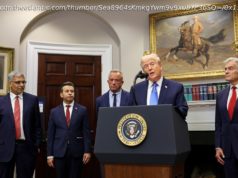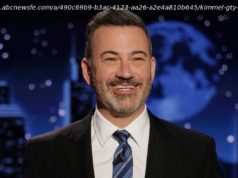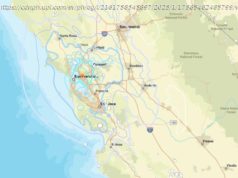This July 4, it’s worth examining if Trump’s America is more independent from the world than Obama’s was. It turns out it isn’ t.
When President Donald Trump took office, many expected him to usher in a new “independent” U. S. foreign policy, breaking the bridges forged by President Obama to multi-national organizations and significantly shifting the direction of American statecraft.
That hasn’ t happened.
This Independence Day, hardly anyone argues anymore that the new administration is seeking independence from international institutions or binding treaties. Indeed, the U. S. has been forward-leaning on the global stage—reassuring NATO; broadly engaging in the Middle East; laying out new initiatives in Latin America; renegotiating, not scrapping NAFTA; talking tough on North Korea; sparring with China; embracing India; and redoubling efforts in Afghanistan.
Critics now complain that Trump is decoupling the U. S. from the post-World War II liberal order, the network of international institutions that fostered globalization. At least philosophically, there is no question that Trump and Obama come at foreign policy from opposite perspectives. Obama was a structuralist who believed that the keys to peace and prosperity are global institutions that normalize the behavior of states. Trump, on the other hand, is a realist. The sitting president holds that nation-states are the coin of the realm, the real power in the global order.
But in practice, the kid from Chicago and businessman from the Big Apple are less far apart than their rhetoric suggests.
For starters, the Constitution still binds the left and right. It still limits what presidents can do overseas, both through specified and imposed powers given to the executive branch, and the separation of powers that gives both the courts and Congress some say in what America does in the world.
In addition, regardless of their politics, presidents get elected to protect the nation’s interests. Those interests don’t change dramatically unless the world dramatically changes. That’s why U. S. foreign policy always has more continuity than change from one administration to the next.
Further, presidents are hardly purists. Obama had a predilection for multi-nationalism, but he was perfectly willing to go his own way when he thought it suited U. S. policy. Likewise, Trump has no prohibitions against a multi-national approach. U. S. commitment to NATO is as strong as ever. Rather than pulling out of the United Nations, the U. S. has been proactive in its leadership role. Trump went to the G7, and he’s going to the G20 and ASEAN summit.
There are still distinct differences between Trump and Obama. Some are mostly stylistic. The Paris climate accord is a case in point. Obama committed to it because it fit his politics, not because it really moved the ball on dealing with climate change. Trump pulled out because he didn’t care about a symbolic commitment. Neither president’s choice tells us much about the real exercise of American power in the world.
Other differences are more substantive. Obama’s instinct was to make a deal and then use the deal and multi-national instruments to normalize the behavior of adversarial states. That was the plan with the Russian reset and New START treaty, chemical weapons accord with Assad, and Iran nuclear deal. Trump’s instincts are to take action where there is a clear deliverable to U. S. interests on the front end, not trust the global order to tutor good behavior on the backside.
However, to portray these differences of statecraft as moving from interdependence to independence—an unmooring of the U. S. from the liberal world order—is a profound oversimplification. In practice, Trump will be seen using different approaches to solving America and the world’s problems—sometimes acting unilaterally, but mostly working with friends and allies, and often through multi-national institutions.
Trump will certainly in the end have different policies. He may in the end produce different outcomes. But, in the final judgment, it may be far more difficult to differentiate between interdependent and independent foreign policies than the current raging controversy over Trump’s international leadership suggests.
James Jay Carafano is vice president of the Heritage Foundation and directs the think tank’s research on foreign relations and national security issues.






